President’s speech: ‘Root to Rise’
Opening convocation speech, as prepared for delivery by President Rebecca Stoltzfus, on Wednesday, Aug. 28, 2024.
Hello, Goshen College! It is wonderful to be here with each one of you.

I am so happy to see our returning students, and I’m eager to learn to know those of you joining us for the first time this fall. I am eager to unveil the fully renovated Westlawn later this year, with its new commons area, community room, dining hall and terrace, and the new Center for Nursing and Public Health. I look forward to having the LeafRaker Cafe and Hunsberger Commons back again soon!
But most of all, I am excited about you — about what you will discover, create and achieve this year. We will make history together.
History is challenging, especially when you are making it. We are in an historic election year that is hard-hitting and emotional. Tragic wars are grinding on, causing massive loss of life, famine, and millions of refugees. Environmental crises loom. We have created new, barely-understood technologies at risk of catastrophic misuse. We are in conflicts around how and where people may move around the world, our identities, what they mean and how we will live together.
This year Goshen College is 130 years old. But here’s a really interesting fact: the start of this 2024 academic year is also the 100th anniversary of the fall when we re-opened, after a period of conflict that led to our temporary closure.
The decade of the 1920s, a century ago, was also marked by cultural conflicts in politics and in the church. Hot topics in the 1920s included immigration, race, science, and the role of religion in society. Political opinion surveys began to be conducted, and the term propaganda was born, as politicians used new forms of media, such as the radio, to propagate their ideas and influence the public – sometimes in misleading ways.
In response, a new magazine was created that would be “nothing but the facts.” In fact, the creators wanted to call it “Facts.” But in the end, they decided to call it Time. Time magazine established the journalistic practice of fact-checking, as a way to separate propaganda from fact. Books were also at the center of the cultural conflicts of the 1920s. Boston became so well known for book banning that “banned in Boston” became a term used to boost the sales of culturally edgy books.
Goshen College unfortunately became entangled in these conflicts. Our founders were Mennonites, and Mennonite Church leaders became alarmed by Goshen’s openness to diverse ideas and the interdisciplinary approaches taught by our faculty. In the summer of 1923, the church exerted their power to close Goshen College.
Historians have drawn various lessons from this conflict, but standing here today, 100 years later, I want to draw our attention to two things.
First, how familiar all of this sounds. Debates about immigration and race, about religion and education, disputes about what is propaganda versus fact and what books are allowed on library shelves.
The second point I want to make is that we re-opened! People persevered through conflict, and the relationship ultimately held. One hundred years later, we remain rooted in the way of Jesus and shaped by Mennonite tradition, AND we remain open to diversity of people and ideas, and the interdisciplinary approaches taught by our faculty.
The Goshen College Record, being founded in 1903, is older than Time Magazine. The Record has been an independent student-edited newspaper since 1912.
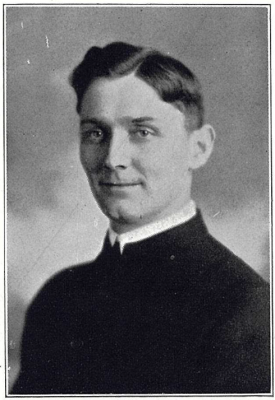
One hundred years ago, Nelson Litwiller, president of the Goshen College Student Senate wrote in The Record:
Out of the loud confusion of the troubled years through which we have passed, new ideas emerge. Ideas of internationalism, peace, brotherhood and service are stressed. But are these ideas really new? Does not history repeat itself?
Yes it does, Nelson.
Conflicts are not new. Conflict is an essential part of the human experience, bringing energy and creative potential. Depending on how we respond to conflict, we may experience “loud confusion” or a breakthrough in understanding – maybe both.
I have been thinking about conflict lately as I practice yoga. Yoga involves creating tension within the physical body – what one of my teachers described as delicious discomfort. Yoga is about relaxing into discomfort.
“Root to rise” is a common phrase in yoga, meaning that to manage the necessary tension within ourselves and find balance, we have to be firmly rooted.
This, I believe, is a year in which we need to root to rise.
I was born in the 1960’s, another tumultuous time. The United States was deeply embedded in a cold war with the USSR. In 1962, the year I was born, the US learned that the Soviets had placed nuclear missile launchers in Cuba. The Cuban Missile Crisis is believed to be the closest the world has ever come to nuclear war.
In 1962, violence broke out at the University of Mississippi as Segregationist rioters sought to prevent the enrollment of its first African American applicant, James Meredith. President John F. Kennedy eventually mobilized more than 30,000 troops to quell the riot on that campus, the largest force ever mobilized for a single disturbance in United States history.
The following year, President Kennedy was assassinated.
In 1962, South Africa arrested anti-apartheid leader Nelson Mandela, beginning his long imprisonment.
That’s a lot for one year – and it’s not even all of it!
My point in telling these hard stories is not to increase our anxiety, but to remind us that people have been through hard times before. Take a deep breath.
Nuclear war was averted. Higher education is not yet equitable, but it is no longer segregated. Just look around you! We celebrate our diversity and are committed to the dignity and success of every one of you. In 1962, plus or minus one year, Sierra Leone, Nigeria, Tanzania, Kenya, Trinidad & Tobago, and Jamaica all gained their independence from colonial powers, and all of those nations are represented in our student body this year!
And Nelson Mandela persevered with faith through his 27-year-long imprisonment to become South Africa’s first Black head of state and the first elected in a fully representative democratic election.
We are made for this: we can root to rise.
Here at Goshen College we are surrounded by prairies and trees. Plants know how to root to rise. It’s not something plants do once, they do it over and over again.
In plant science, the word adventitious is used to describe a plant structure that is surprising or out of the ordinary, such as a root produced by a branch.
Adventitious roots are the roots of regeneration, grown in response to stress. Plants send out adventitious roots when they are not getting the nourishment they need. In response to environmental overwhelm, such as flooding. And in response to wounding.
Adventitious – a combination of adventure and delicious. In human terms, it means to reach out, to extend ourselves in new and creative ways to get what we need to thrive – even through discomfort.
This year, we need to be adventitious. Grow the roots of regeneration. Root to rise.
I want to introduce you to the 20th century philosopher, Hannah Arendt. Arendt was born in 1906 to a Jewish family in Germany. She obtained an excellent education during the rise of totalitarianism and Adolf Hitler. After the Nazi’s took power, she fled with her mother to France. This photo was taken in that year.
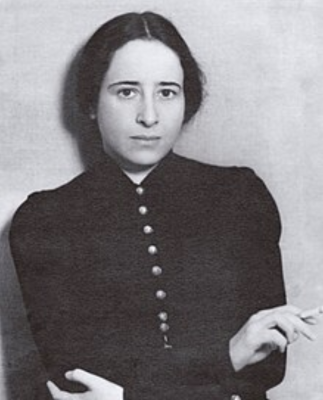
As World War II broke out, she was separated from her mother, stripped of her citizenship, and held for six weeks in an internment camp, what we might call a detention center. She was part of a group of women who escaped. Undocumented, she walked over the mountains to Spain, where she connected with other refugees and eventually, with people who helped her obtain papers to emigrate.
She came to New York, where she built connections, hosted great parties with other creative people, and continued to write and do research on politics, evil, love, and the human freedom to change the course of history.
She was one of the leading political philosophers of the 20th century. She eventually became a professor and taught students like you at a small liberal arts college.
I’m going to pull a few quotes from her writings as I share some advice for this year.
Here are three ways to be adventitious as we make history this year.
First, be rooted in love.
Arendt provided a brief and powerful definition of love. Love says: I want you to be.
I would add: I want you to be you.
Love — in friendship, family, romance or politics — is an act of intention and will. Love is the will to extend one’s self for the purpose of nurturing your own or another’s growth. Love is gentle, fierce, and steadfast.
Arendt was a realist, and this led her not to believe in violence. She said, “You can change the world through violence, but the likelihood is you’ll change it to an even more violent world.”
So when politics becomes overwhelming, when we are flooded with negative messages in the media, where do we turn?
Look to the intimate field of friendship. Find people who are dreaming and imagining together. Make music. Craft positive conversations with your friends and colleagues. People who love you; who want you to be.
Second, be rooted in dignity.
Arendt wrote that Dignity is made between people. She believed that human dignity is conditional and political, and that it must be asserted and recognized by other people in order to exist. Dignity is something that we give each other through the quality of our connections.
At Goshen, shaped by Mennonite faith, we hold as sacred the dignity of every person. We commit to value, affirm and protect your dignity. I agree with Arendt, that dignity is only an idea until we create it on behalf of one another through the quality of our relationships.
Through your struggles and conflicts and solidarity, assert your dignity and make dignity between each other.
Third, be rooted in joy.
As a professor during the social movements of the 1960’s, Arendt told her students to have fun! Have as much fun as you possibly can.
I agree wholeheartedly. Let us create joy on this campus this year.
There is a sense of human completeness that comes along with being and acting in concert with others in the world, and it’s supposed to be fun. . . there is joyousness in this.
Drew Lanham, a contemporary professor of ecology and an activist for social and climate justice, wrote a poem entitled, Joy is the justice we must give ourselves. The poem speaks at length to the adversities we face, but it ends this way:
Joy is my seeking.
Your being.
It is mine for the taking.
Ours to share.
More than enough to go around.
Have yourself a heapin-serving.
Have seconds. Or thirds.
‘Cause joy is the justice we must give ourselves.
Here is one more story about roots of regeneration, that begins in Trinidad and lands at Goshen College.
The Caribbean Island of Trinidad went through centuries of occupation. Europeans, in their quest to produce sugar, coffee and cocoa, brought enslaved people from Africa to Trinidad.
Black Trinidadians were rooted in drumming. And the dignity and joy created by their drumming was threatening to colonial power.
In the late 1800’s, the colonial government tried to ban sticks and drums. Essentially, they tried to ban percussion! But Trinidadians were adventitious.
They used metal objects, like car parts, paint pots and oil drums, as percussion instruments. Over time they learned to tune the pans in sophisticated ways.
The steel pan, or steel drum, was created by Trinidians who were determined to make music. Who said to each other: I want us to be.
Possibly the only musical instrument made out of industrial waste, the steel drum has become an icon of Trinidadian culture, rooted in Love, Dignity, and Joy.
The music of steel drums has been taken up around the world. Six years ago, the family of one of our alumni, Thomas Schlabach, a steel drum player from Arizona, gifted a set of steel drums to Goshen College. Their music is the sound of resistance and it is the sound of joy. And it is a sound that you will hear at GC! Yes, you can play the steel drums! When you hear their music, be reminded of the human capacity to root to rise.
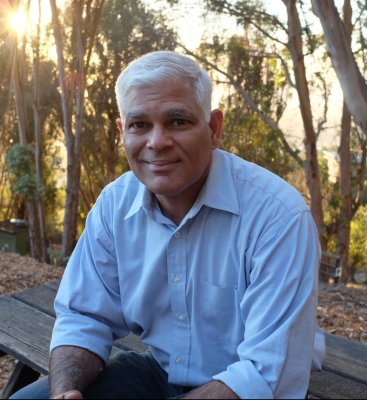
And now, I want to introduce you to another alum, Shashi Buluswar. Shashi came to Goshen College from Calcutta, India, and now teaches at UC Berkeley, working toward solutions for combating global poverty. In 2021 he established the Global Citizenship Award for GC rising seniors who represent our Core Values in courageous, creative and compassionate ways.
As Shashi explains: In light of the unprecedented range of challenges we face today, now more than ever in recent memory, the world needs a new generation of leaders who can think big, act boldly, and force positive systemic change with courage, kindness and humility. The recipients of the Global Citizen award have shown remarkable potential to become exactly such leaders and change-makers. I hope this award serves as an early recognition of what I’m sure will be an extraordinary journey. Congratulations!
Shashi is with us this morning, and I want to celebrate his generous support for our community.
Students were nominated for this award by faculty and wrote an application essay. This is a highly selective award, and I want to commend every student who was nominated.
And now I am thrilled to announce the 2024 winners of the Global Citizenship Award.
The first of two runners-up, who will receive a $5,000 scholarship, is Silas Immanuel.
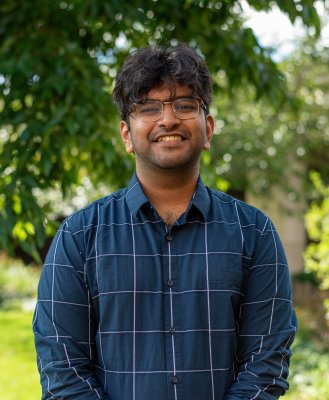
Silas is a film production and accounting double major from Delhi, India. Describing his time at GC as “the longest SST yet,” Silas has felt motivated to make the most of his opportunity here. Silas has embraced his faith through attendance at East Goshen Mennonite Church and through leadership in the Unity bible study group on campus. He is also a leader in the International Student Club and FiveCore, while working in ITSMedia. One of his proudest accomplishments was creating a documentary about the City of Goshen’s sundown town history. That documentary has won national awards and is being shown at numerous film festivals. In the free time he does have, Silas is intentional about building community, organizing volleyball games or barbecues in his backyard for other international students.
Congratulations, Silas!
The second runner up, also receiving a $5,000 scholarship, is Arleth Martinez.
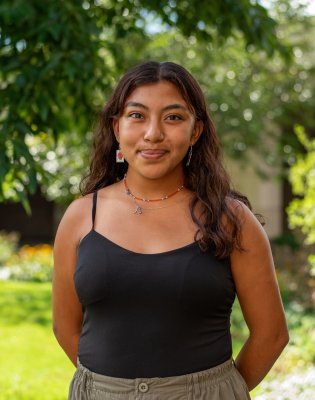
Arleth is a sociology major from Mexico City, Mexico, who resides in Goshen. Arleth has had many involvements at GC, such as writing and editing for The Record, being a PIN leader and an SST ambassador, serving as RA, and is a cross-country athlete. Arleth did all this while co-founding and co-leading One Circle, GC’s indigenous advocacy group. Arleth felt “called to something bigger” after spending time with Apache leaders from Oak Flat, Arizona, on SST. Arleth led the cross-country team to dedicate their to the Apache, an act of solidarity that has been meaningful to both her and the Apache. For Arleth, running has become “sacred” — she wrote, “When I run, it is my prayer.”
Congratulations, Arleth!
And the recipient of the $10,000 Global Citizenship scholarship is Fatima Zahara!
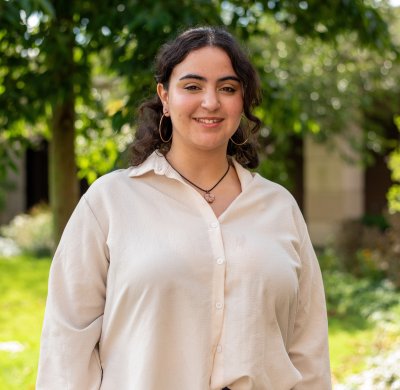
Fatima is a theater and music double major from Orlando, Florida. Fatima is “radically hospitable” and “consistently shows significant care and thoughtfulness for her peers. She goes out of her way to make people feel welcome and supported in groups. Fatima is well-known across campus for her participation in every single choir concert, play and musical since coming to GC. She has been in Parables for two years, is a member of the Queen Singers and works at the Goshen Theater downtown. Fatima wrote about the challenges of coming to a Mennonite school as someone who grew up Muslim — and how Goshen has given her the tools to channel her desire for peacemaking. In her life after college, Fatima hopes to lift up stories from around the globe, especially voices from North Africa and the Middle East. In so many ways, she plans to “remain ever-singing.”
Congratulations, Fatima!
And to each and every one of you: We are living through good and hard times. This year, be adventitious. Establish new and surprising roots in love, in dignity, and in joy.




